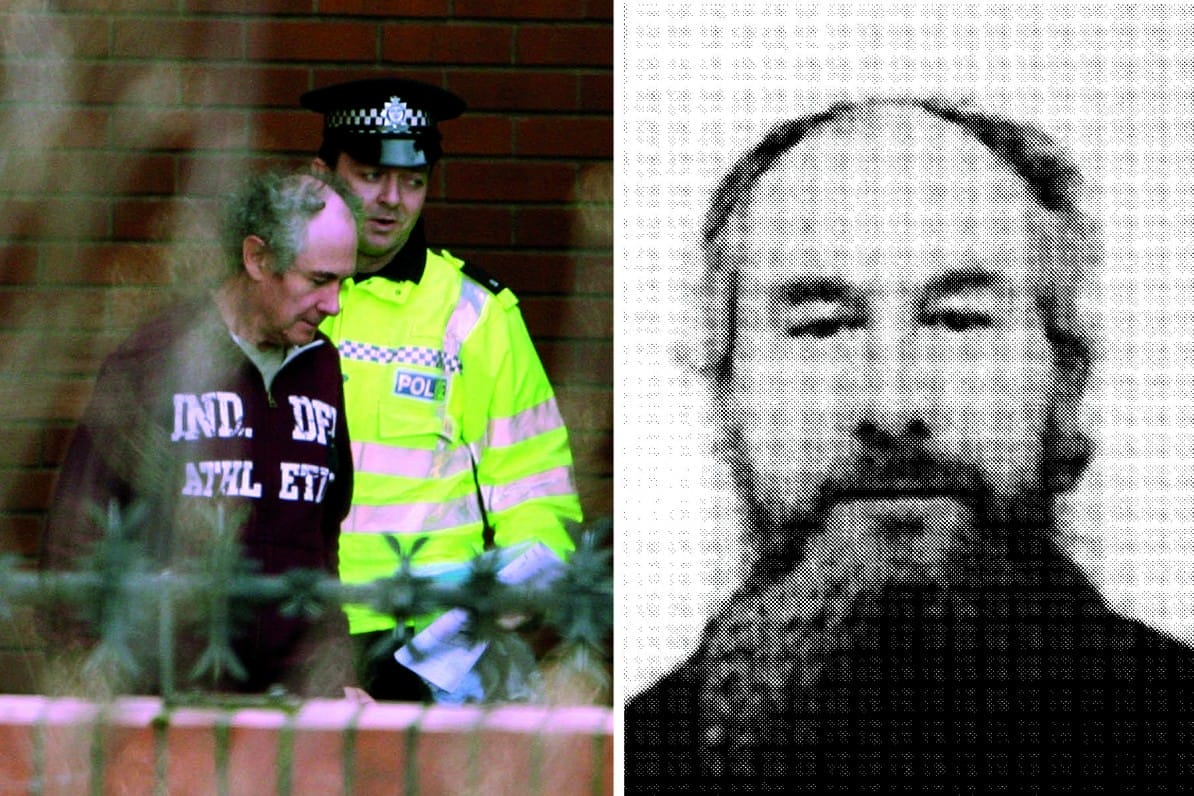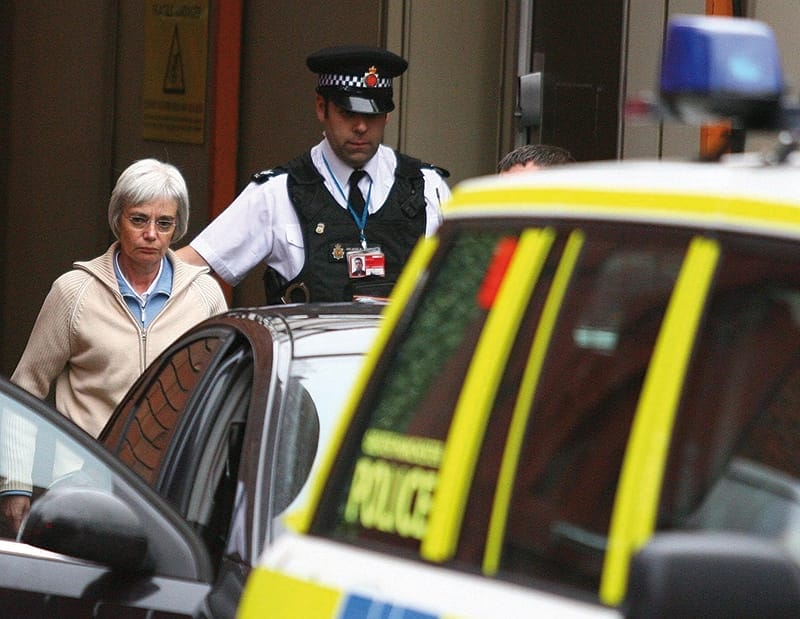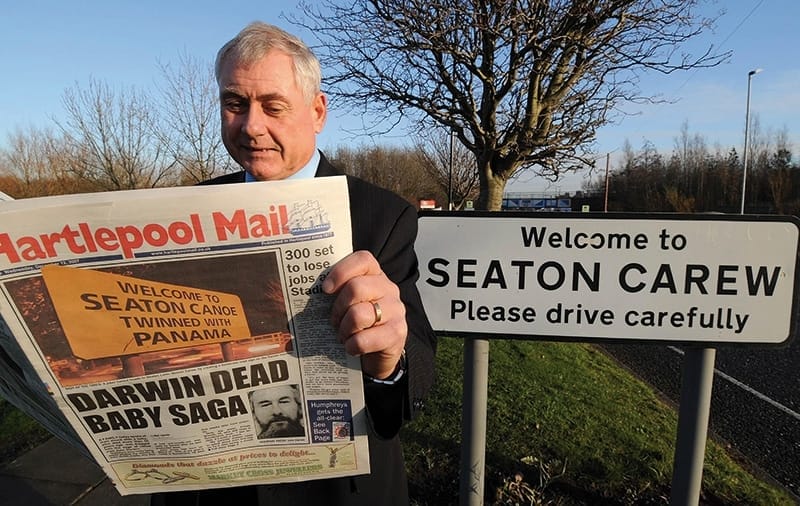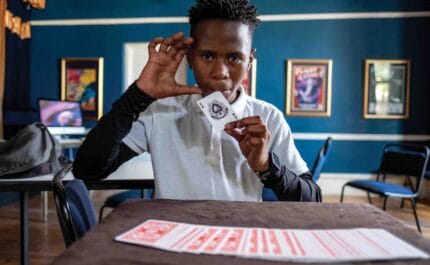How to fake your own death in the digital age
In December 2007 the UK media became obsessed by the bizarre story of the so-called ’Canoe Man’ – and just what drove John Darwin to fake his own death to start a new life in Panama. Back in issue one of DG, Matthew Lee discovered that even there he was unable to evade ubiquitous technology, and asked how modern escape artists can evade the digital dragnet

John Darwin leaves Hartlepool Magistrates Court in 2007. Photos: AP Photo/Scott Heppell, AP Photo/Cleveland Police
1st December 2007 (Taken from: #1)
On December 1st 2007, John Darwin walked into West End Central police station in London claiming to have lost his memory. His wife Anne, who had recently moved to Panama, was elated; his sons overcome with joy. But the police, the media and the public were suspicious. How could a man who’d died in a canoeing accident five years earlier have such a great tan?
The unnamed woman who typed “John”, “Anne” and “Panama” into Google Images and found the happy couple posing for a photograph on the Move to Panama website explained the motives for her search: “Nobody can simply vanish in this day and age. There has to be something, some sign.” Having made her discovery, she contacted the Cleveland Police and the Daily Mirror. The paper published the photo, taken in a Panama office in July 2006, in a front-page scoop. Accosted by tabloid hacks, Anne tearfully confirmed she was the woman in the picture. “My sons will never forgive me,” she told them. “They knew nothing. They thought John was dead.” The game was up.
That Christmas, John Darwin was the nation’s pantomime villain. The public could forgive him for defrauding insurers (a sum we later discovered was over £350,000), but we couldn’t understand how anybody could allow their sons and elderly father to believe they were dead. He was roundly ridiculed on two counts of perceived stupidity. Why had he posed for such an incriminating photograph? And why on earth had he come back and handed himself in?

Early speculation about his return centred around the idea that he missed his sons and could no longer live without them. Before long, rumours spread that Anne was in a relationship with a Canadian man, and since all the Darwins’ assets were in her name, she could leave her husband stranded, broke and effectively non-existent if he didn’t go home to save their marriage. Counter rumours circulated about an American woman John Darwin had met over the internet while hiding in a bedsit attached to the family’s Hartlepool home. He’d flown out to meet her in Kansas on at least two occasions, it was said, although she later insisted they only ever spoke about business.
Step by step, we edged closer to the facts and began to understand his motives. We discovered that Cleveland Police had reopened the case a few months before Darwin’s return. Anne had created suspicion with her unlikely move to Panama and one of her colleagues had informed the police about suspicious whispered phone conversations she was having at work. Did the knowledge that he was under investigation force John’s hand?
It was a daring plan with one major flaw: John Darwin hadn’t searched for himself on Google”
The most compelling explanation for Darwin’s return can be found in an email he sent to his wife in which he wrote of the difficulty of securing Panamanian visas. His tourist visa had expired and he needed an investor’s visa to stay in the country, which required verification from authorities in the UK who were unlikely to be fooled by forged travel documents. The only way they could remain in Panama, where they’d purchased several acres of land to build an ecotourism resort (specialising, rather amusingly, in adventure canoeing) was to hand himself in and hope British police believed his story.
It was a daring plan with one major flaw: John Darwin hadn’t searched for himself on Google. Technology was moving at a far greater pace than the Darwins could run. With the rise of surveillance cameras, border control biometrics (iris recognition and fingerprint scans), social networking sites, government databases, supermarket loyalty cards, online retail and so on, living without leaving traces was much harder in 2007 than 2002. Panama is over 5,000 miles away from Britain, but a Panamanian website takes under a second to load. Disappearing was the easy part. Staying disappeared was a lot tougher.

Anne Darwin, arrested on arrival at Manchester Airport by Cleveland Police, 9th December 2007. Photo: PA
Frank Ahearn is America’s number one skip-tracer, a person who finds people. He believes technology has completely changed the way the game is played, but that the balance of power between the chaser and the person being chased isn’t necessarily different. “Information on the internet is not always accurate,” he says. “You can use the internet for disinformation, too. I don’t think there’s that much difference between today and ten years ago. Then you’d pick up the phone and try and convince somebody at the other end of the line to give you information and now we go online and do the same thing. It just depends whether you’re good at it. In this business, technology is a double-edged sword.”
In 2002, only a few months after Google Images launched, John Darwin excelled at the art of disappearance. With the name John Jones on his passport he travelled to Gibraltar to look at yachts, to Kansas to check out farms, and to Panama to buy property. Keeping his first name may have been convenient but it was a mistake; it left him more exposed on search engines. The photograph taken in the offices of Move to Panama demonstrated a lack of foresight when it came to technology.
David Bond is a filmmaker who employed a team of private investigators with himself up as the target; their efforts to track him down, and his to evade detection, became the basis of his film Erasing David. Bond is impressed Darwin survived as long as he did. “The thing about disappearing is that is only takes one error on the part of the disappearee, while the chaser can make many errors,” he says. “Setting his motives aside, I felt sorry for him. He’d survived so long but was eventually caught out by technology.” When Cleveland Police reopened the Darwin file, it was only a matter of time before they found him.
In his film, Bond packs his bag, says goodbye to his heavily pregnant wife, and drives to Belgium, hoping to get some distance between himself and the chasing pack. His motive for running was a growing obsession with the idea that in the past decade Britain has become a surveillance society, with the average adult now on over 400 databases. Before launching his experiment, he contacted 80 private and commercial organisations and asked what they knew about him. The results were shocking. They knew where he’d been, what he’d been buying and who his friends were. For these reasons, he feels compelled to applaud any person who manages to get off the grid.
The idea that people might just walk away from all that responsibility and survive is a thrilling one and I wish that Darwin had carried on”
“It’s a wonderful feeling that somebody’s managed to find a way to get one overon the system,” Bond says. “From cradle to grave you have to keep checking in, giving away your data. The UK is not a police state, but you do have to check in with the equivalent of the police station at least every year for your tax. The idea that people might just walk away from all that responsibility and survive is a thrilling one and I wish that Darwin had carried on.”
“The problem with Darwin is what he did to his kids,” adds Frank Ahearn. “Nobody gives a shit about the insurance companies, but to tell your kids you’re dead is cold-hearted. John Darwin did something that all of us at some point in our lives wish we could do, just walk the fuck away from everything.”
Indeed, there’s something irresistible about the idea of people disappearing, whether it’s Lord Lucan, Michael Rockefeller or Abbie Hoffman. The idea of a second chance is tied to the concept of freedom, which is especially resonant in the US where it is almost seen as a birthright. Vanishing may be extreme, but it delivers extreme freedom.
Ahearn believes Darwin failed because “any crime with women and money involved is always going to be a disaster.” Darwin’s love of money is well documented. He played the stock market, invested in properties, drove expensive cars with personalised number plates, and endlessly boasted to friends and colleagues that he was going to be a millionaire. He was drowning in debt when he disappeared.
John Darwin did something that all of us at some point in our lives wish we could do”
Even after being caught, Darwin is still trying to make his million. Ahearn wrote to Darwin in prison and didn’t receive a reply, but did get a phone call from Alan Caramanica, a former cellmate of Darwin’s and a convicted fraudster, who had smuggled the Canoe Man’s handwritten memoirs out of prison. Darwin, who couldn’t profit from his work while behind bars, had signed the rights over to Caramanica who’d promised him half of any takings. Caramanica phoned Ahearn and offered him the rights to Darwin’s life story for $250,000. “He’d read the letter I’d written to John Darwin and he was just trying to scam me,” Ahearn recalls. “He was crazy.”
John Darwin is certainly obsessed with money. But was the early speculation that he returned because he missed his sons entirely inaccurate? “A private investigator said something to me that really stood out,” David Bond recalls. “He said that everybody ends up going back to a family member at some time and this cuts to the heart of the question, whether we’re social creatures or private creatures. A successful disappearee is a purely private creature and at some point that will become self-destructive and they’ll need to revisit some kind of social contact from their past.”
A potent mix of greed, loneliness and desperation led John Darwin to West End Central police station. Technology led to his downfall. The Lord Lucan school of disappearance is yesterday’s model. Today’s vanishing acts don’t only have to disappear physically, they have to erase themselves virtually, too.

A Seaton Carew businessman catches up with local news, December 2007. Photo: John Giles/PA Wire
Erasing David is available on DVD from amazon.co.uk. The book How to Disappear by Frank Ahearn is also available from amazon.co.uk. If you’re planning to disappear yourself, bear in mind that both sites will store your details on their databases.
Update, March 2017:
In July 2008 John and Anne Darwin were both convicted of fraud and each received a sentenced of more than six years in prison – though both were realesed from jail in 2011. The couple have since divorced and John remarried in June 2015. It was reported at the time that Darwin, now 64, planned to return to Panama with his new wife, a woman in her thirties originally from the Philippines. In January 2017, however, the Daily Mirror found him living in a tiny apartment in the Filipino capital of Manila, subsisting on his UK pension and occasional work selling underwear on his wife’s market stall.
Ex-wife Anne, meanwhile, published a book in September 2016 called Out of My Depth which promised to reveal all about their plot to cash in on his disappearance. By July 2015 the Crown Prosecution Service had recovered well over half a million pounds’ worth of defrauded life-insurance and pension payouts from the couple, in assets held mostly in Anne’s name.
Slow Journalism in your inbox, plus infographics, offers and more: sign up for the free DG newsletter. Sign me up
Thanks for signing up.








